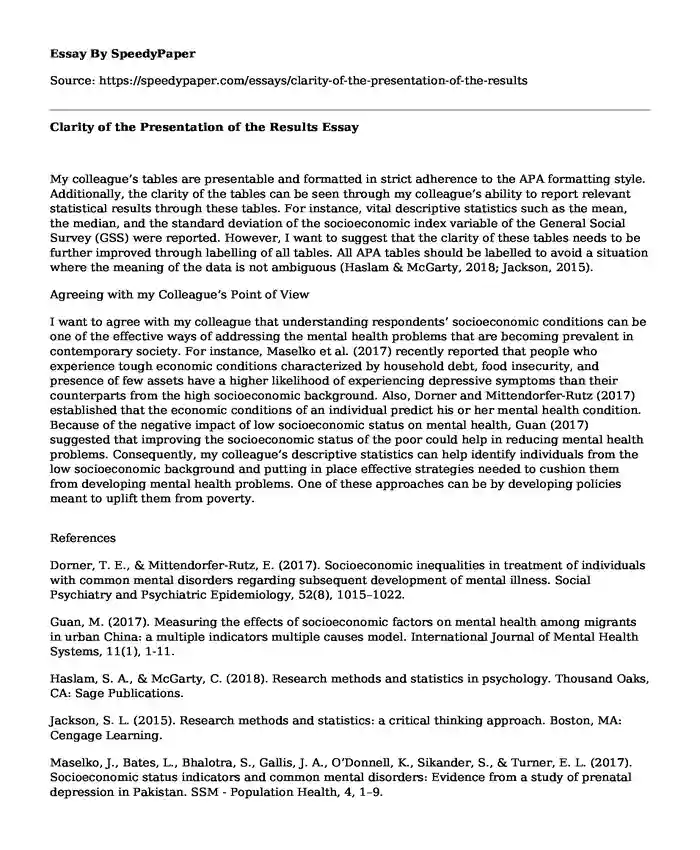
| Type of paper: | Essay |
| Categories: | Finance Analysis Technology |
| Pages: | 2 |
| Wordcount: | 406 words |
My colleague's tables are presentable and formatted in strict adherence to the APA formatting style. Additionally, the clarity of the tables can be seen through my colleague's ability to report relevant statistical results through these tables. For instance, vital descriptive statistics such as the mean, the median, and the standard deviation of the socioeconomic index variable of the General Social Survey (GSS) were reported. However, I want to suggest that the clarity of these tables needs to be further improved through labelling of all tables. All APA tables should be labelled to avoid a situation where the meaning of the data is not ambiguous (Haslam & McGarty, 2018; Jackson, 2015).
Agreeing with my Colleague's Point of View
I want to agree with my colleague that understanding respondents' socioeconomic conditions can be one of the effective ways of addressing the mental health problems that are becoming prevalent in contemporary society. For instance, Maselko et al. (2017) recently reported that people who experience tough economic conditions characterized by household debt, food insecurity, and presence of few assets have a higher likelihood of experiencing depressive symptoms than their counterparts from the high socioeconomic background. Also, Dorner and Mittendorfer-Rutz (2017) established that the economic conditions of an individual predict his or her mental health condition. Because of the negative impact of low socioeconomic status on mental health, Guan (2017) suggested that improving the socioeconomic status of the poor could help in reducing mental health problems. Consequently, my colleague's descriptive statistics can help identify individuals from the low socioeconomic background and putting in place effective strategies needed to cushion them from developing mental health problems. One of these approaches can be by developing policies meant to uplift them from poverty.
References
Dorner, T. E., & Mittendorfer-Rutz, E. (2017). Socioeconomic inequalities in treatment of individuals with common mental disorders regarding subsequent development of mental illness. Social Psychiatry and Psychiatric Epidemiology, 52(8), 1015-1022.
Guan, M. (2017). Measuring the effects of socioeconomic factors on mental health among migrants in urban China: a multiple indicators multiple causes model. International Journal of Mental Health Systems, 11(1), 1-11.
Haslam, S. A., & McGarty, C. (2018). Research methods and statistics in psychology. Thousand Oaks, CA: Sage Publications.
Jackson, S. L. (2015). Research methods and statistics: a critical thinking approach. Boston, MA: Cengage Learning.
Maselko, J., Bates, L., Bhalotra, S., Gallis, J. A., O'Donnell, K., Sikander, S., & Turner, E. L. (2017). Socioeconomic status indicators and common mental disorders: Evidence from a study of prenatal depression in Pakistan. SSM - Population Health, 4, 1-9.
Cite this page
Clarity of the Presentation of the Results. (2022, Dec 06). Retrieved from https://speedypaper.com/essays/clarity-of-the-presentation-of-the-results
Request Removal
If you are the original author of this essay and no longer wish to have it published on the SpeedyPaper website, please click below to request its removal:
- Essay Sample: Transitional Processes of Adult Day Care Facilities
- Free Essay Example on Information Technology Privacy
- Essay Sample about the Geothermal Activities of Imperial Valley
- Protestant Reformation and Art, Essay Sample for Your Inspiration
- Free Essay Providing an Overview of HIV/AIDs in Peru
- Paper Example on Nature of Writing
- Essay Sample on Psychoanalytic Psychotherapy
Popular categories




